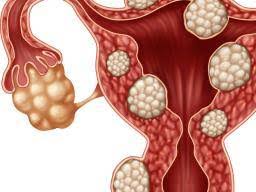Uterine hypertrophy refers to the uniform enlargement of the uterus. The basic pathological changes of the disease are the changes of smooth muscle cells and vascular wall in the myometrium of the uterus. The uterus is enlarged evenly and the muscular layer is 2.5-3.2 cm thick. The cut surface is grey-white or pink, the hardness increases, and the bundles are arranged in a knitted way.
The arteries and veins are obviously dilated and there are clusters of elastic fibers around the new vessels. A disease with varying degrees of uterine bleeding. The main clinical symptoms are increased leucorrhea. In addition, as connective tissue proliferation and inflammation spread to the pelvis along the cervix or through the uterosacral ligament, there are lumbosacral pain or perineal swelling.
There are many reasons for uterine hypertrophy. For example:
1. Uterine.
(1) The elastic fibrous tissue in the myometrium of many parturients proliferates between smooth muscles and around blood vessels, resulting in uterine hypertrophy. (2) Primary uterine vascular lesions lead to uterine hypertrophy.
2. Ovarian dysfunction. Continuous estrogen stimulation can make the uterine muscular layer hypertrophy. In clinic, patients with functional uterine bleeding, especially those with longer course of disease, have different degrees of uterine enlargement.
3. Inflammation. Chronic adnexitis, pelvic connective tissue inflammation and chronic myositis of the uterus cause the proliferation of collagen fibers in the myometrium of the uterus, and cause the fibrosis of the uterus.
4. Pelvic congestion. Causes the uterus connective tissue proliferation, also may cause the uterus hypertrophy.
5. Pathogens. The pathogens causing cervical hypertrophy are mycoplasma,
chlamydia, bacteria and viruses.
Common symptoms are: increased leucorrhea, lumbosacral pain or perineal swelling.
1. Excessive menstruation, prolonged duration;
2. Shortened cycle to about 20 days, menstrual volume and duration did not change significantly;
3. Prolonged menstrual period, but not much. Most of the patients are multiparous women, and most of them are more than 3 births. Anemia appeared in those with long duration of illness and more bleeding. The uterus was enlarged evenly by gynecological examination, usually 6 weeks gestation size, and a few are more than 8 weeks gestation size, with tough texture. Bilateral ovaries may be slightly enlarged with multiple follicular cysts.
In daily life, we can avoid from the following aspects:
1. Avoid spicy, stimulating food.
2. Eat more fruits and vegetables.
3. Eat more high-protein, low-fat food.
Daily care:
1. Family planning can reduce the incidence of the disease.
2. Change underwear frequently, and underwear should be wide, do not wear non-cotton products such as nylon underwear.
3. Patients' underwear, used bathtubs, towels, etc. should be boiled.
For the treatment of uterine hypertrophy, androgen therapy can be used, and surgery can be performed for those who are ineffective in conservative treatment. Whole hysterectomy may be considered if conservative treatment is ineffective. Those under 50 years old with normal ovaries should be retained. In addition, herbal medicine can also be taken for treatment. Fuyan Pill is taken from nature.
There are no side effects of ovulation stimulating drugs or progesterone drugs. Patients can take it at ease. In addition, Fuyan Pill has the functions of clearing heat and detoxification, activating blood circulation and promoting Qi, anti-proliferation and anti-fibrosis. It can effectively eliminate various bacteria, viruses, Mycoplasma and Chlamydia infection, regulate menstruation, promote blood circulation and relieve pain, and can effectively cure endometrial thickening.





